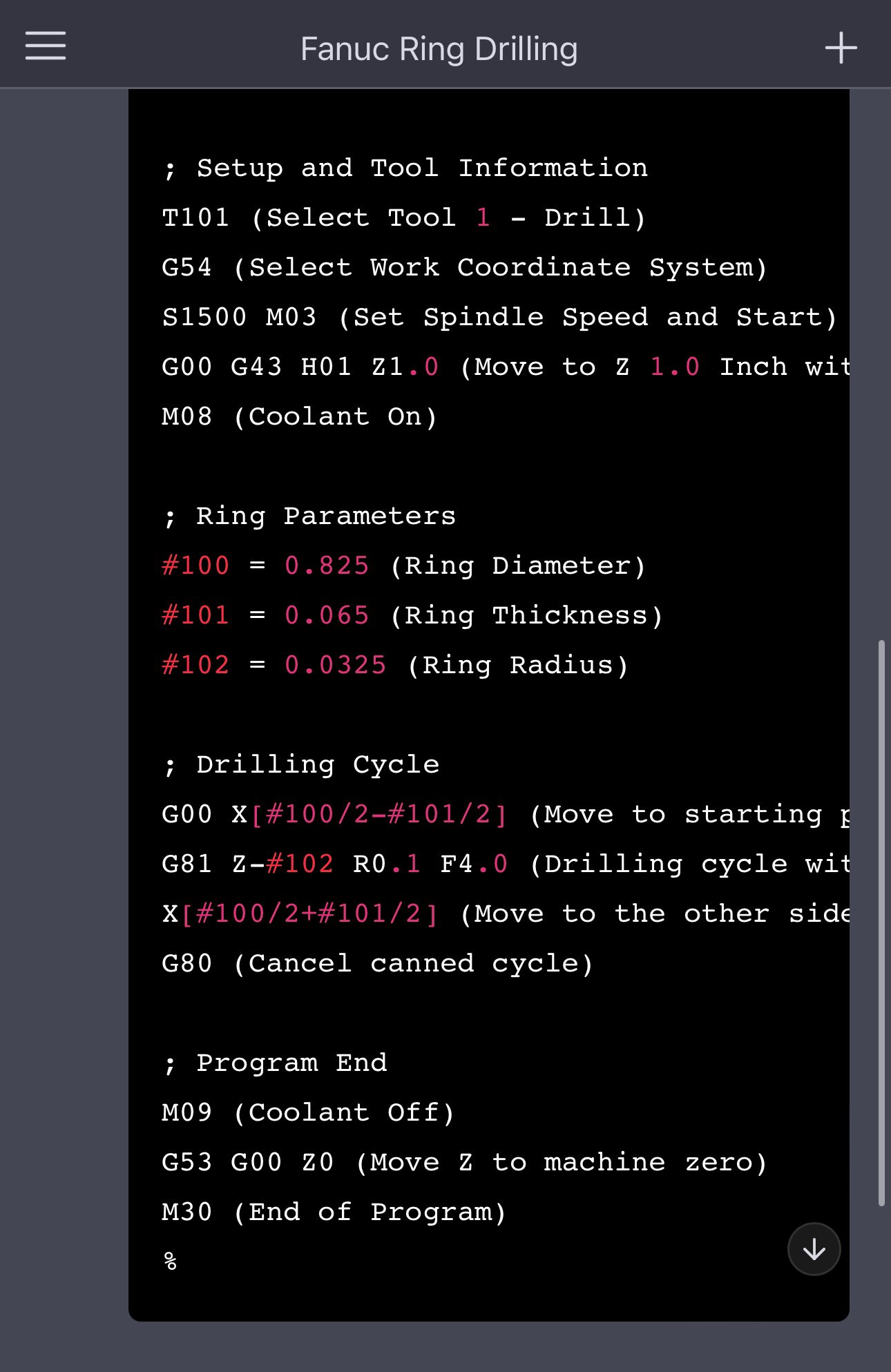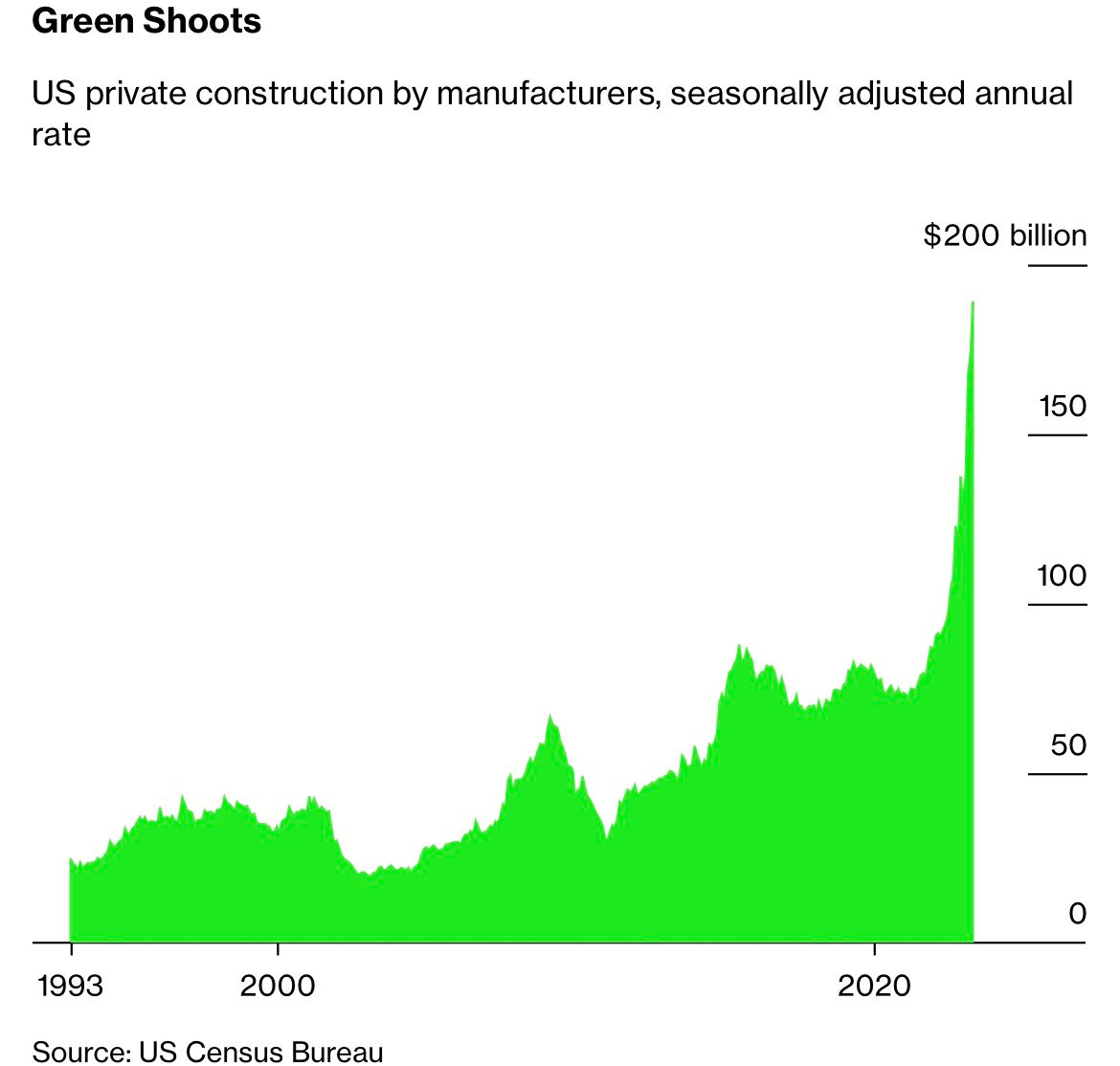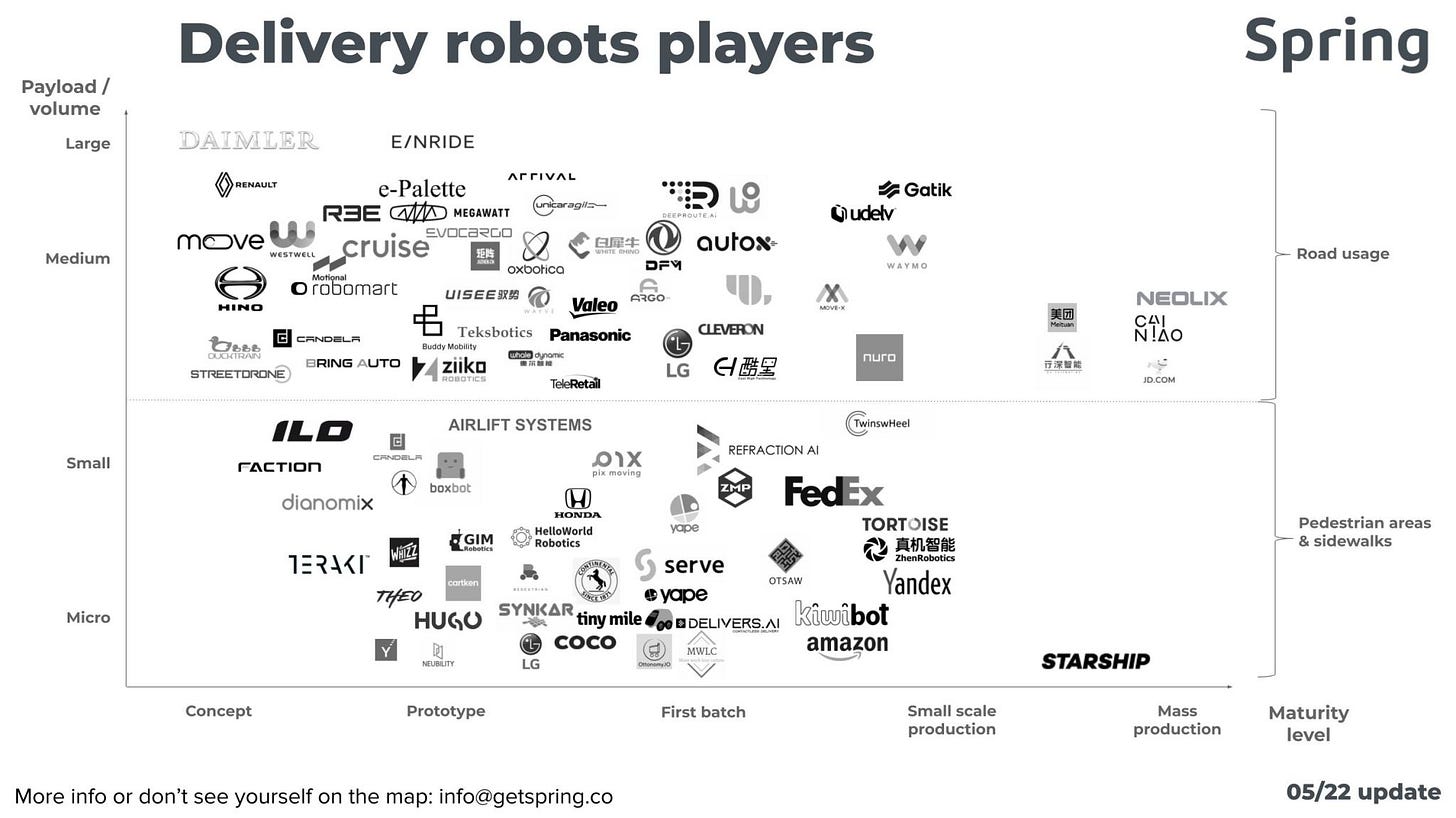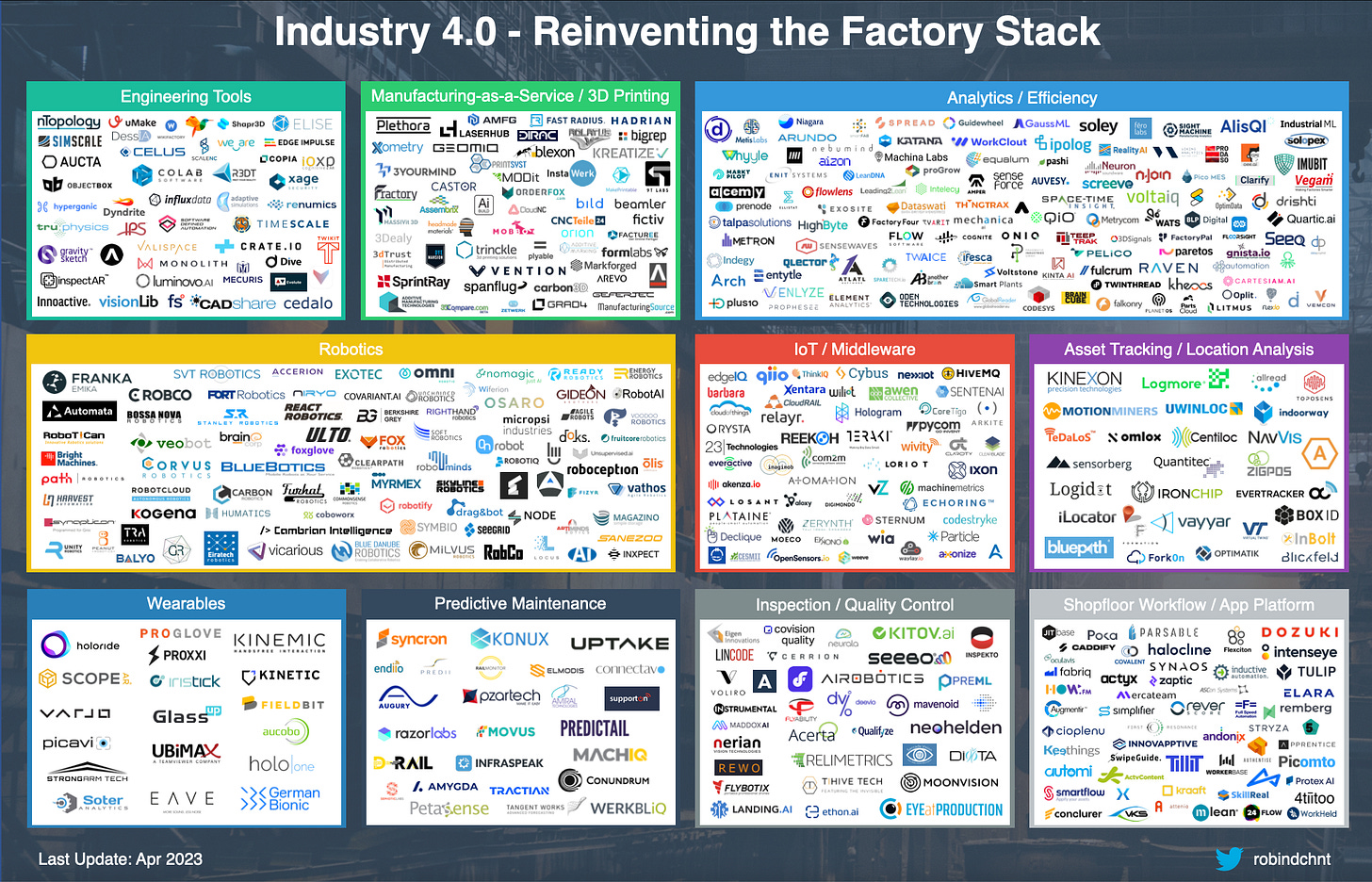Issue #45 - The Future of Manufacturing
Topics this time: artificial intelligence in manufacturing, hidden champions, autonomous delivery robots players, infrastructure startups, and many new funding rounds in Q2.
👋 Welcome to Issue #45 👋
Hey there!
Recent advancements in AI are capturing the interest in every industry right now, including manufacturing. You might remember the saying “manufacturing is data rich but information poor” - maybe AI and LLMs are here for the rescue?!
While the potential of AI is very exciting, we should not neglect the ground work of bringing data to the cloud, connecting machines and assets and building interfaces. As always, it will be a question of time and we’ll see if manufacturing will be a frontrunner or laggard when it comes to AI applications. Reading about AI agents that can use a digital twin to optimize the performance of a manufacturing system make me very optimistic about the potential AI can bring to manufacturing.
My company Kwest continues to help more and more renewable energy installers such as Installion and Solation to save time and reduce frustrating, manual work when installing solar panels. We’ll enable them to have one source of truth for all project data and build workflows for photo documentation, customer updates, and customized reports. Reach out here if you want to learn more.
Enjoy reading!
Robin
Got a friend or colleague interested in the future of manufacturing? Help me spread the word by sharing the newsletter if you like it!
I. What I’ve enjoyed reading 👇
🥇 Germany's niche companies are a model for life after globalization
Germany has been a major beneficiary of globalization, with cheap energy from Russia and access to emerging markets. However, the shift towards deglobalization poses challenges for the country. While big corporations may be too dependent on China, Germany's true economic engine lies in its lesser-known middle-sized companies known as the "Mittelstand." These companies dominate their niches and contribute to the majority of businesses and jobs in Germany (often called “Hidden Champions”). Three examples highlight how these hidden champions are adapting to the changing global landscape. Herrenknecht AG, the largest tunneling company, is expanding beyond China to new markets. Scio Automation GmbH takes a cautious approach to working with China and focuses on regionalization and automation. Wafios AG specializes in producing machines for bending wires and pipes and emphasizes quality and innovations for electric vehicles. The success of these hidden champions lies in their niche expertise, complex defenses against competition, and strong customer relationships.
The German graphic below shows you the number of world market leaders (“hidden champions”) per country from a study of the IWD.
🤖 Ikea is using autonomous drones indoor for operational efficiency
IKEA has expanded its autonomous drone fleet to 100 drones across 16 locations in Europe. The initiative is part of the company's technological expansion and aims to improve customer fulfillment and operational efficiency. The drones, deployed during non-operational hours (mostly at night), ensure stock accuracy and provide real-time inventory updates. The collaboration between IKEA's franchising partner, Ingka, and Zurich-based startup Verity has been instrumental in developing this technology. It’s one of the first successful use cases of indoor drones I’ve come across at.
🪄 The future of engineering is assisted
Marco Witzmann, founder of Valispace, has written an interesting article that adds to our recent AI debate. His core thesis is that “Assisted Engineering” will lead to faster and better design of safer products.
The current process of hardware engineering usually follows a V-Model with steps such as specifying, breaking down, designing, verifying, and validating. Safety in product design is ensured through adherence to standards and certification processes. Marco envisions a future where every engineering action is assisted by AI, accelerating the brainstorming, retrieval of information, triggering of simulations, reviewing, system modeling, and documenting processes. He emphasizes the importance of complementing AI with math and engineering structure, as well as maintaining verification and certification processes to ensure safety. Ultimately, AI assistants can be seen as valuable colleagues that enhance productivity and lead to better designs, but human oversight and quality control remain essential.
🪄 GPT-4 can generate CNC code for a milling machine
Following the AI hype, YC president Garry Tan showed an example how GPT-4 can generate CNC code for a milling machine. The code might not be production ready yet but it shows the potential of how we could run CNC milling machines sooner or later.
🏭 US is experiencing a mega boom in manufacturing
Massive investments in U.S. heavy industry are shaping the economy for years. The 2010s lacked investment, but now billions are pouring into megaprojects like batteries, solar cells, and semiconductors. This is fueled by Biden's legislation and pent-up demand. Even German manufacturers such as Meyer Burger - a solar panel manufacturer - is thinking of setting up a new factory in the US instead of Germany. The graphic below gives you an overview of the construction spending in manufacturing in the US over time:
II. About industrial Startups and Companies
🤖 A map of autonomous delivery robots players
Damien Declercq has been maintaining a map of autonomous delivery robots players. Kudos to him and his work, below you can find his map:
🏭 The rise of the infrastructure startup
I’m a strong believer that disruption to manufacturing will come more from the outside (ie. new companies) than from the inside (ie. existing companies). Sifted has written an article about “infrastructure startups” and the trend that VCs are getting comfortable to back a whole new kind of company. It’s similar to a WSJ article that highlights why Venture Capitalists should bet on America.
Both articles underline that a new generation of infrastructure startups is emerging, specializing in fields like carbon capture and materials science. These startups face challenges in securing funding from traditional VCs due to their capital-intensive nature. Companies like Northvolt and Storegga are seeking investment from a diverse range of sources, including asset managers, state banks, and private equity firms. Such capital-intensive startups are finding creative ways to mitigate risks, such as renting existing facilities instead of building new ones. However, successful infrastructure startups require experienced founders with industry credibility and access to massive capital (we’d need more of them!).
🤑 Config has raised $5M seed round
Config has raised $5M in seed funding for its hardware development coordination software. The platform helps hardware teams to collaborate efficiently by consolidating CAD files, supply chain documents, and external vendor communications. Config's investors include Twitter founder Biz Stone and former Facebook VP Dan Rose. The software aims to provide hardware companies with the same level of sophistication in managing design and build processes as tech giants like Apple. Config integrates with popular CAD programs such as Solidworks and Siemens NX and plans to expand to other tools in the future.
💸 Eclipse has raised $1.23bn across two new funds
Palo Alto-based venture firm Eclipse has raised $1.2bn across two new funds, bringing its total capital under management to $4bn. The firm focuses on investing in legacy industries that need to modernize to stay competitive. Eclipse's wide-ranging portfolio includes investments in automation, healthcare, and digital transformation. It has backed manufacturing startups such as Bright Machine, Foxglove, and Instrumental in the past.
🤑 Ocado group acquires 6 River System
In issue #20, I’ve written about the acquisition of the Autonomous Mobile Robot 6 River System by Shopify. After nearly 4 years in the hands of Shopify, Ocado will add 6 River System to its fulfillment solutions.
III. Additional funding news in short 👇
👉 Sparetech (DE): has raised a €10M Series A led by Insight Ventures for its data platform for industrial spare parts. Read more…
👉 Tanso (DE): has raised a €4M Seed round led by Capnamic for its software to help industrial manufacturers carry out sustainability reporting and carbon accounting. Read more…
👉 Covariant (US): has raised a $75M Series C extension led by Radical Ventures and Index Ventures for its AI-based robotics solutions. Read more…
👉 Zaptic (UK): has raised a $10M Series A led by Molten Ventures for its manufacturing no-code platform. Read more…
👉 Spread (DE): has raised a $16M Series A led by HV Capital to scale its engineering intelligence solution for complex mechatronic products. Read more…
👉 Volition (US): has raised a $11M round led by Newark Venture Partners and Quiet Capital to build the largest marketplace of industrial components. Read more…
👉 Anybotics (US): has raised a €46M Series B led by Walden Catalyst and NGP Capital to scale its advanced-legged robots for industrial inspection. Read more…
IV. Additional content and the I4.0 Landscape
My Industry 4.0 Landscape
I’ve updated my Industry 4.0 Landscape in April 2023. There are more than 500 active startups in this landscape. I also needed to remove 30+ companies that either got acquired or shut down in 2022. I have a list of more companies to add and will do that if I find the time for it in summer. Click on the link for a larger version.
If you think there is something missing, then please let me know.
Thank you for reading The Future of Manufacturing! Subscribe for free to receive new posts and support my work.







